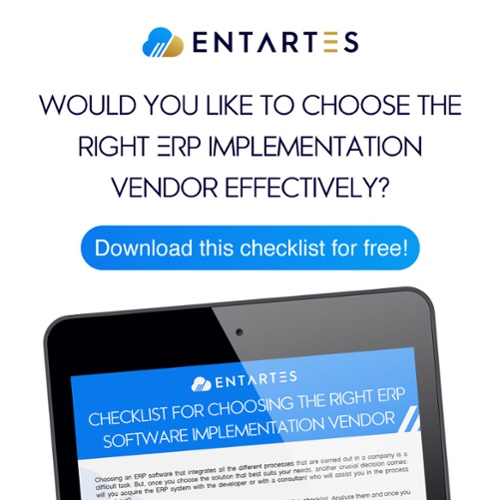It comes as no surprise that companies function differently based on their size. This is no...
Why Do ERP Implementations Fail?
I have seen time and time again how large companies with huge budgets and ample resources fail in their ERP implementations. Why does this happen? What can you do to avoid it?
Here are some of the most common reasons why ERP implementations struggle so you know what to look out for.For companies considering deploying an Enterprise Resource Planning (ERP) system, there is often much uncertainty around the decision.
And it's understandable. These solutions are often the core of a company’s operations and, if not deployed correctly, can cost the company vastly. Many disaster stories of implementation failures can attest to that— even with extremely well established companies such as Nike, Revlon, Hershey's, to name a few.
Why did these large companies, with huge budgets and ample resources, failed? I've listed the primary reasons I consider essential. Use them to prepare in advance or avoid them altogether.
Poor Preparation
I’m sure you’ve heard the saying, “Proper Preparation Prevents Poor Performance.” This statement holds even more value when it concerns your ERP implementation. The last thing you want is to start rolling out the software only to realize you severely underestimated the number of resources you need. Poor planning or no plan at all can lead to failure before the implementation even starts, so mapping the road ahead is paramount.
If you decide to implement without a consultant or partner, make sure your employees understand the time commitment to complete the implementation. If your employees are already juggling multiple responsibilities with a maxed out workload, it might be time to bring in temporary employees and/or hire a consultant to make sure you stay on top of day-to-day activities.
Lack Of Company-wide Support
Your whole company, including managers and executives, needs to fully support the transition to your ERP system. Although knowingly difficult to get attention from executives, they must realize this is a rare exception and requires just as much commitment from them as the project managers/users.
Commitment from everyone in the company will ensure you are allocating enough resources to stay on track with your deployment schedule and keep red flags to a minimum.
Miss(or no)Communication
Clear communication throughout the implementation process is a must, especially for your employees whose jobs will be affected by the change in software.
You want to ensure your workers are comfortable with the new system and understand the changes that are being made. Make sure they feel confident in the direction of the company and how your ERP system can drive that change.
Over Customization
Although customization can be a valuable asset for your ERP system to align the software features with your business needs, it does present some challenges. As your system becomes more complex with different customization options, you run the risk of going over budget, not meeting deadlines and even failure to implement successfully.
Although most ERP systems will have some type of customization added, be sure to talk with your vendor or consultant and weigh the risk factors associated with crafting a more custom system.
No Project Management
With a project of this magnitude, regardless if you’re implementing your ERP system internally or with a consultant, you need an experienced project manager to spearhead your implementation.
As I mentioned said earlier, if you don’t prepare for the amount of workload an implementation can be, it’s almost certain your implementation won’t succeed. Don’t automatically assume that you can divide the project management up between a group of employees or stack it on top of someone’s normal workload. Assign a dedicated, driven project manager with proven leadership that will hold your team accountable and meet deadlines.
Vague Internal/External Duties
If you decide to hire a consultant, project manager, or any other external resources to help assist your ERP implementation, it’s important to establish the working relationship between both of you. Just because you decide to hire externally does not mean you should hand the reins over and sit back.
That's why it's so important that you, your implementation team, and your ERP software partner sit down and plan ahead.
When planning, establish a relationship with your consultant and know what's expected from all sides and who does what— due dates, frequency of communication, proper training and research, etc. Use your external resources to your advantage but don’t become over-reliant and dependent.
Lack Of Training
Arguably, it is the most important factor to ensure your implementation is successful.
Your ERP system will remain the core of your company for years to come and your employees need to be familiar with the software. As software continues to develop and tap into different areas of companies (i.e. finance, supply chain, sales, etc), more end-users are working with the software than ever before.
User training should be a primary focus of your deployment and should include any employees that will be interacting with the software on a regular basis.
Insufficient Testing
It’s easy to overlook frequent testing once the workload starts to increase, however, you shouldn’t skip out on this part of the implementation.
There’s more to the testing phase than just to make sure the software works. Use your testing phase(s) to ensure the experience for the end-user is best, you meet your business needs, customizations function correctly, and your system runs smoothly.
X Key Takeaways From This Blog
-
Companies of all sizes fail to implement ERP correctly not for lack of trying, but due to poor planning and improper budgeting.
-
With an investment of this magnitude affecting the core of your business, you don’t want to leave any room for error.
-
A majority of these issues can be solved by making sure you have a thorough implementation plan, proper preparation, and ample resources, whether they be internal or external.
-
Setting up a dedicated implementation team and communicating with your employees from the very beginning should also be part of your ERP implementation plan.




.jpg?height=200&name=ERP%20implementation%20problems%20(1).jpg)

Blog Comments